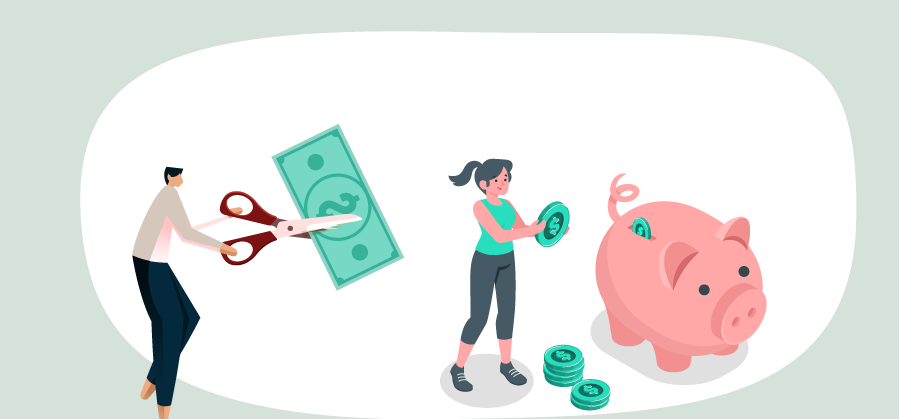10 Techniques to Cut Your Spending – And of Course Raise Savings!

For the first quarter of 2021, the total amount of household debt in the United States was a record high of $14.6 trillion, which is certainly a lot of debt. The only way out is to cut down on spending, which is as well a big task – much bigger than it sounds.
You may not be aware of where you are overspending and it may be difficult to overcome long-held habits when figuring out how to minimize expenditure. Instead of spending your money on things that don't enhance your quality of life or financial status, consider cutting back on non-essential expenditures.
Keep track of your expenditures
Make sure you know where your money is going. You might spend a few hundred dollars on small purchases each week and not know it.
- Use a separate bank account for all of your spending.
- As you go, keep a record of what you're doing.
- To assist you, consider utilising an app.
- You can also try the envelope method for this.
Set Up a Budget
Establishing a budget is as simple as understanding how much money you make, how much you spend, and making a strategy to spend less than your income in order to save the difference.
The following are the most important steps in creating a budget:
- Determine your income.
- Determine your fixed monthly expenses, such as your mortgage or rent, utilities, car payment, insurance, and so on.
- Determine your basic necessities, such as food, gas, and medical care.
- Your "discretionary spending" is what's left over. You should set aside money for an emergency fund, and you should also set aside money to pay down credit card debt.
You may want to consider using solely cash
There are a few advantages to just using cash as a method of payment.
- You can see your money being spent in real time when you use cash instead of credit cards, which has been found to reduce spending.
- You can't go over budget if you're not taking on debt.
Impose a 24-hour time limit on all purchases
According to a Credit Donkey survey conducted in 2013, more than half of those polled said they regularly felt bad about their purchases. Money spent on something that doesn't provide happiness to your life is a waste.
This approach assists in:
- Realizing if the purchase is actually necessary
- Setting aside unnecessary purchases
- Do away with impulsive buying.
Spend-free days are a good idea
Simply deciding not to buy anything is one of the most effective methods to cut back on your expenditures
If you have no-spend days in place:
- You pledge to make no purchases that day.
- You agree to purchase only essentials, such as food for your family to eat at home.
- You end up saving money
- It has a long-term effect on your attitude.
Treat this mission like a game
Making saving money a game can turn budgeting and spending restrictions into something enjoyable.
- Make it a point to reward yourself for reaching financial goals.
- Conduct a how-low-can-we-go competition.
- Saving five-dollar cash for every saving you make or every expense you mark unnecessary.
Always have a list with you when you go shopping
It's a simple practice that has the potential to save money on groceries, improve meal planning, and reduce impulse purchases if you adhere to it.
Some of the tips are:
- A weekly shopping list is a great way to keep track of what you need and when.
- Create categories for each of the items on your list.
- Shop around for the best deals at a few locations rather than driving all over town looking for the best deals at a bunch of different places.
Stop paying for services you are no longer using
There's a good chance you're paying for a subscription service that you don't get much benefit from.
Consider this:
- How frequently do I rely on it?
- Is it truly necessary?
- Is it possible for me to go without this?
Unsubscribe from any newsletters or regular adverts that come from the source after cancelling the membership.
Reduce the Cost of Your Rental Home
On average, people earning under $50,000 spend 36.6 percent of their income on housing. This is above the 30% rule of thumb that financial experts recommend.
To save money on rent, renters have a variety of options. Among them:
- A roommate can be considered.
- Let go of a reserved parking spot.
- Get a discount on your rent if you do the repairs yourself.
Lower Your Interest Rates by Consolidating Your Debts
Consolidating various debts into a single monthly payment is known as debt consolidation.
The following are some of the advantages of debt consolidation:
- A single monthly fee.
- Lower the rate of interest.
- Pay off your debts faster.
William Makepeace Thackeray said,
“Though small was your allowance, You saved a little store:
And those who save a little, Shall get a plenty more.”
There's no better time to cut back on your spending than right now.
In order to make the process easier and more manageable, take it one step at a time.
